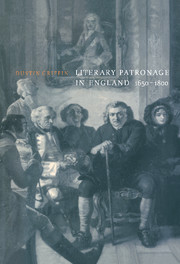Book contents
- Frontmatter
- Contents
- Acknowledgments
- 1 Introduction
- 2 The cultural economics of literary patronage
- 3 The politics of patronage
- 4 John Dryden
- 5 Jonathan Swift
- 6 Alexander Pope
- 7 Edward Young and Richard Savage
- 8 Mary Leapor and Charlotte Lennox
- 9 Samuel Johnson
- 10 The persistence of patronage
- 11 Conclusion
- Bibliography
- Index
3 - The politics of patronage
Published online by Cambridge University Press: 22 August 2009
- Frontmatter
- Contents
- Acknowledgments
- 1 Introduction
- 2 The cultural economics of literary patronage
- 3 The politics of patronage
- 4 John Dryden
- 5 Jonathan Swift
- 6 Alexander Pope
- 7 Edward Young and Richard Savage
- 8 Mary Leapor and Charlotte Lennox
- 9 Samuel Johnson
- 10 The persistence of patronage
- 11 Conclusion
- Bibliography
- Index
Summary
Pope and Swift regularly complained that Walpole disregarded the best authors of the day, and apparently cared little or nothing for poetry: he only paid for what Swift ironically called “solid Work” – i.e., for writing that advanced his political program. Walpole had, so they claimed, corrupted the process of patronage by politicizing it. Similar complaints were made against Bute by the anti-ministerial writers in the 1760s at a time of equally intense partisan feeling. Authorial complaints were in turn taken up by sympathetic nineteenth-century biographers like Forster, who lamented that fine writers like Goldsmith were ignored while shameless but serviceable hacks were rewarded, and by literary historians like Collins who distinguished between the “less honourable” pensions paid to purely “political” writers, and the “honourable” pension awarded to Johnson. Pope's mid-twentieth century critics and biographers have likewise tended to adopt rather uncritically his view of Walpole's “stable” of “hacks,” “hirelings” and “creatures.”
But why should we assume that Pope was right, when his views are clearly not those of a disinterested observer? It is not mere coincidence that complaints about the abuse of patronage by government ministers tend to come from the political opposition. Reconstructing the context of the 1760s confirms that Bute's practice was in fact not significantly different from that of Walpole. Indeed, Walpole was not the exception but the rule. He differed from those ministers who preceded and followed him primarily in that he made more efficient use of techniques that they too practiced.
- Type
- Chapter
- Information
- Literary Patronage in England, 1650–1800 , pp. 45 - 69Publisher: Cambridge University PressPrint publication year: 1996

